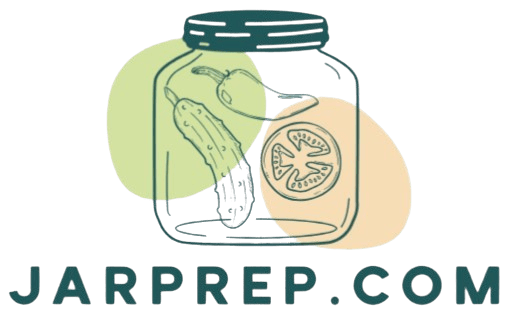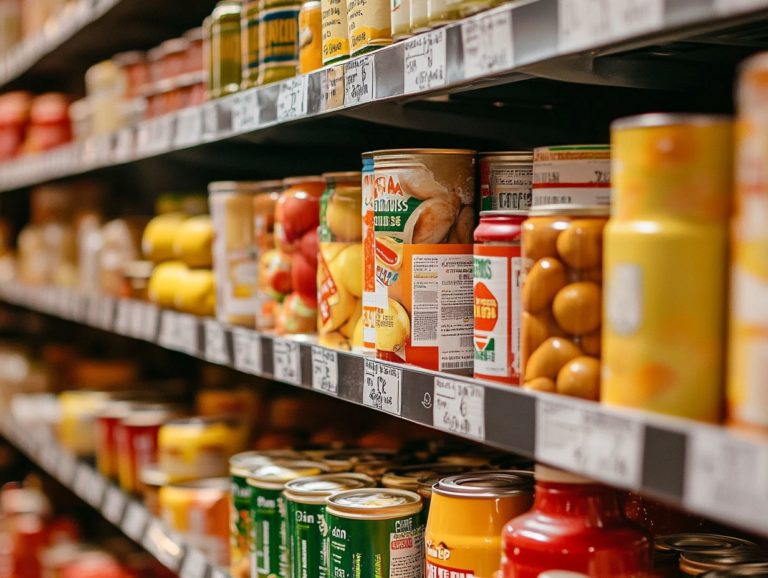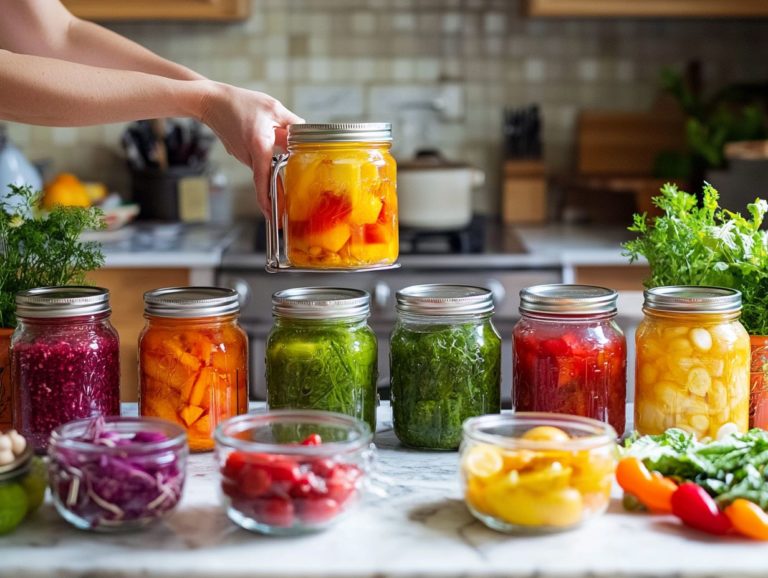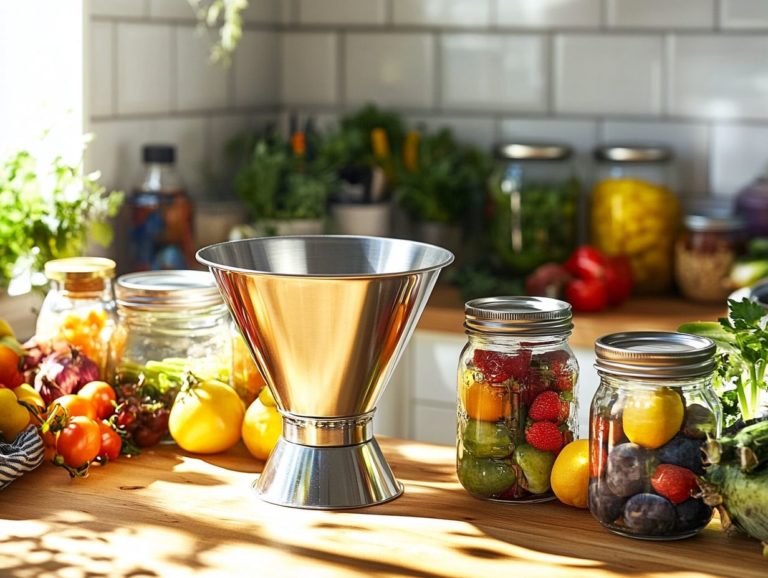How to Tell if Canned Food is Bad?
Canned foods are a staple in your pantry, providing both convenience and a long shelf life. But how can you determine when they re safe to eat, especially with concerns about food safety and potential issues like botulism?
This article delves into the true meaning of expiration dates on canned goods. It points out the signs that suggest a can has gone bad. It also examines the health risks of consuming spoiled food and offers essential tips for proper storage and handling to keep your canned items fresh.
Stay informed to ensure your meals remain not only safe but also delightful!
Contents
Key Takeaways:
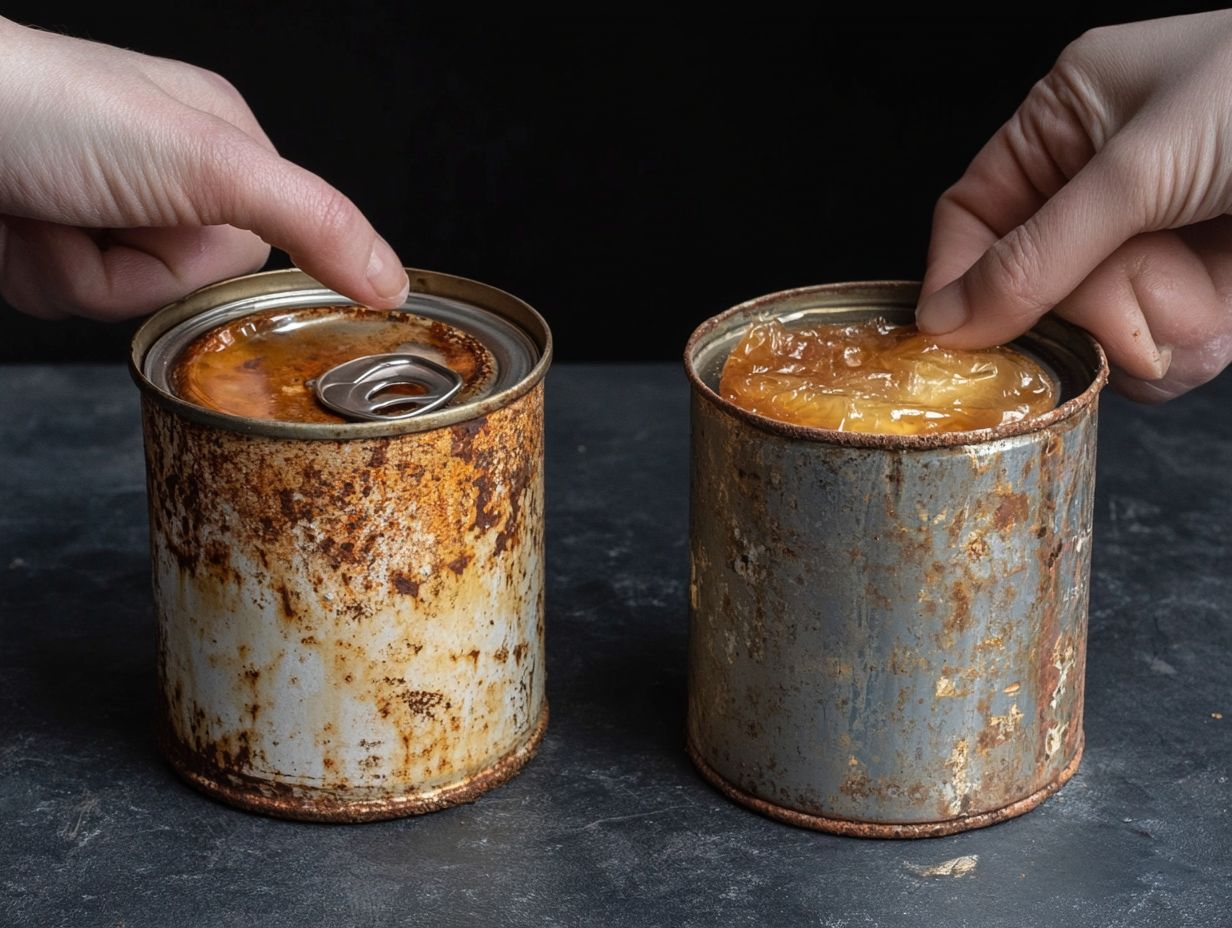
- Check expiration dates on canned foods and know their meanings.
- Look for visual signs, like rust or dents, before eating canned food.
- Stay cautious! Eating spoiled canned food can be harmful.
Understanding Expiration Dates on Canned Foods
Understanding expiration dates on canned foods is crucial for food safety. It also ensures your home canning practices follow USDA guidelines.
These dates indicate the timeframe during which canned goods whether low-acid foods like vegetables or high-acid items like pickles are expected to remain at their best quality and safety. This highlights the importance of proper canning and food preservation techniques.
Ignoring these dates can lead to eating spoiled food, which may cause serious illnesses, including foodborne illnesses like botulism, stemming from a type of bacteria that can cause serious sickness if food is not handled properly. It s essential to understand the signs of contamination.
What do Expiration Dates Mean?
Expiration dates on canned foods serve as essential markers of quality and safety, enabling you to make informed decisions about when to enjoy various products.
These dates can take different forms, such as “best before,” “sell by,” and “use by,” each carrying its unique significance. The “best before” date suggests when a product is likely to retain its optimal flavor and texture.
The “sell by” date indicates the last day retailers should display the item to ensure it remains fresh. On the other hand, “use by” is a stricter guideline, representing the final date for safe consumption.
It’s important to understand that consuming canned goods beyond these dates might lead to a decline in quality. However, many products can remain safe for a considerable time if stored correctly, especially if using methods like vacuum sealing or pressure canning.
Overlooking these labels can come with potential health risks, as some foods may develop harmful bacteria or toxins if not handled properly.
Signs that Canned Food has Gone Bad
Identifying the signs that canned food has gone bad is crucial for safeguarding your health. It’s important to know exactly what to look for regarding contamination and spoilage in your canned goods.
Being vigilant can prevent foodborne illnesses and ensure that your meals remain safe and enjoyable.
Visual and Sensory Indicators
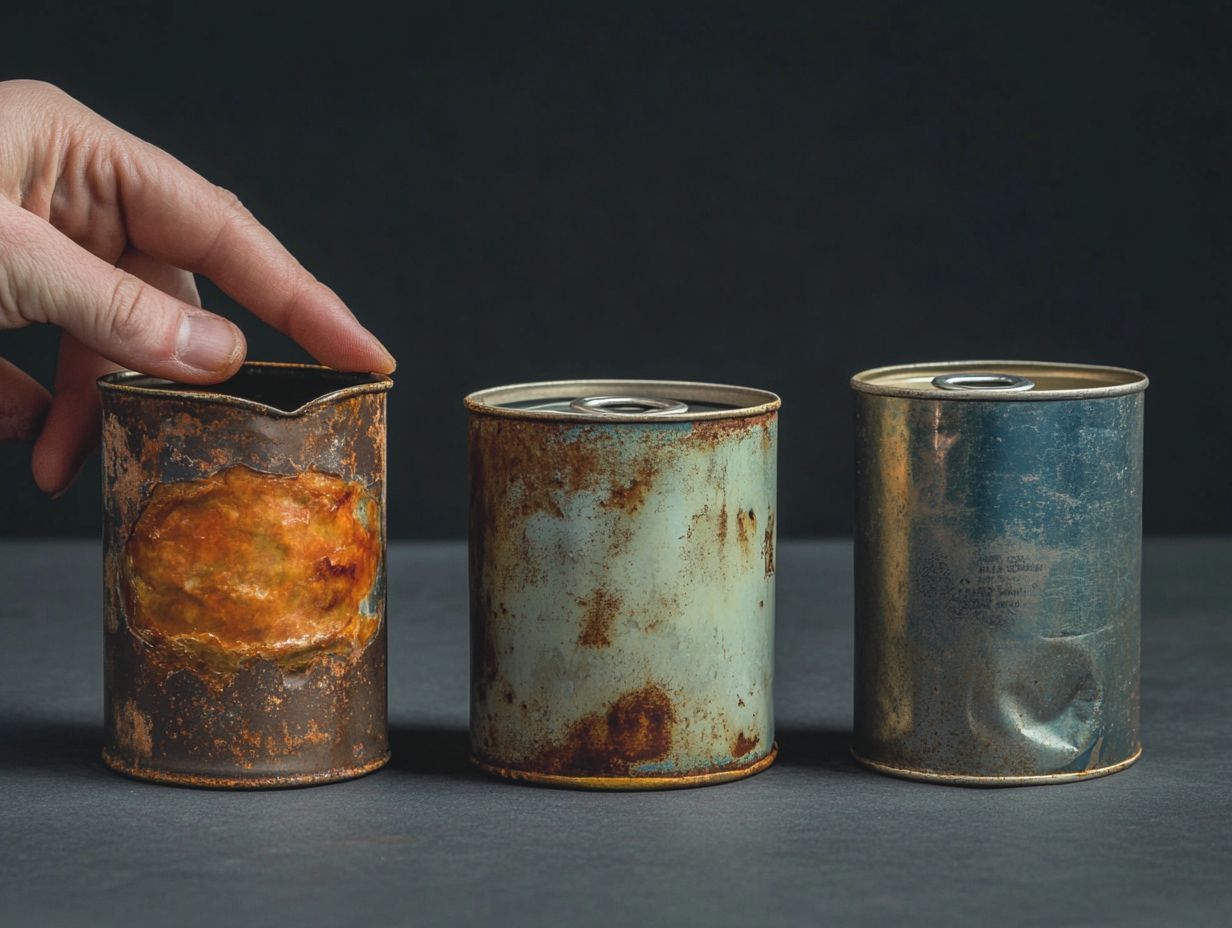
Visual and sensory indicators are essential when assessing the safety of canned food, as many signs of spoilage are easily recognizable without any specialized equipment.
For instance, if you notice rust on the can’s surface or visible signs of corrosion, it s a clear warning that the integrity of the can may be compromised. This could allow harmful bacteria to infiltrate. Dented cans should also raise your eyebrows, particularly if the dent is near the seam.
Let s not overlook bulging lids they’re a major red flag, signaling gas buildup from microbial activity that could lead to hazardous conditions like botulism.
Be alert for unusual odors or changes in texture, such as unexpected sliminess, which can indicate spoilage. Always check your canned food! A quick inspection can keep you safe from serious health risks.
Dangers of Consuming Spoiled Canned Food
The risks of consuming spoiled canned food are significant. Engaging in this practice can lead to serious health complications, including foodborne illnesses like botulism. This illness results from toxins produced by Clostridium botulinum, often due to improper sealing or handling of canned goods.
Potential Health Risks
Consuming spoiled canned food can cause serious issues such as food poisoning and botulism, which may require an urgent trip to the emergency room.
Botulism is a particularly alarming illness caused by the toxin from Clostridium botulinum bacteria. If you experience symptoms like fatigue, weakness, dizziness, blurred vision, or difficulty swallowing or breathing, seek medical help immediately.
Recognizing these signs quickly is crucial, as botulism can escalate rapidly, potentially leading to respiratory failure if not addressed. Prevention is the best way to avoid problems. Use proper canning techniques, follow best-by dates, and store canned goods in cool, dry conditions to reduce contamination risks.
Always inspect canned products for any signs of damage or bulging before consuming them.
Proper Storage and Handling of Canned Food
Proper storage and handling of canned food are essential for maintaining food safety. Prioritizing these practices ensures that your home-canned goods remain safe to eat over time, which is crucial for food quality.
Tips for Keeping Canned Food Fresh
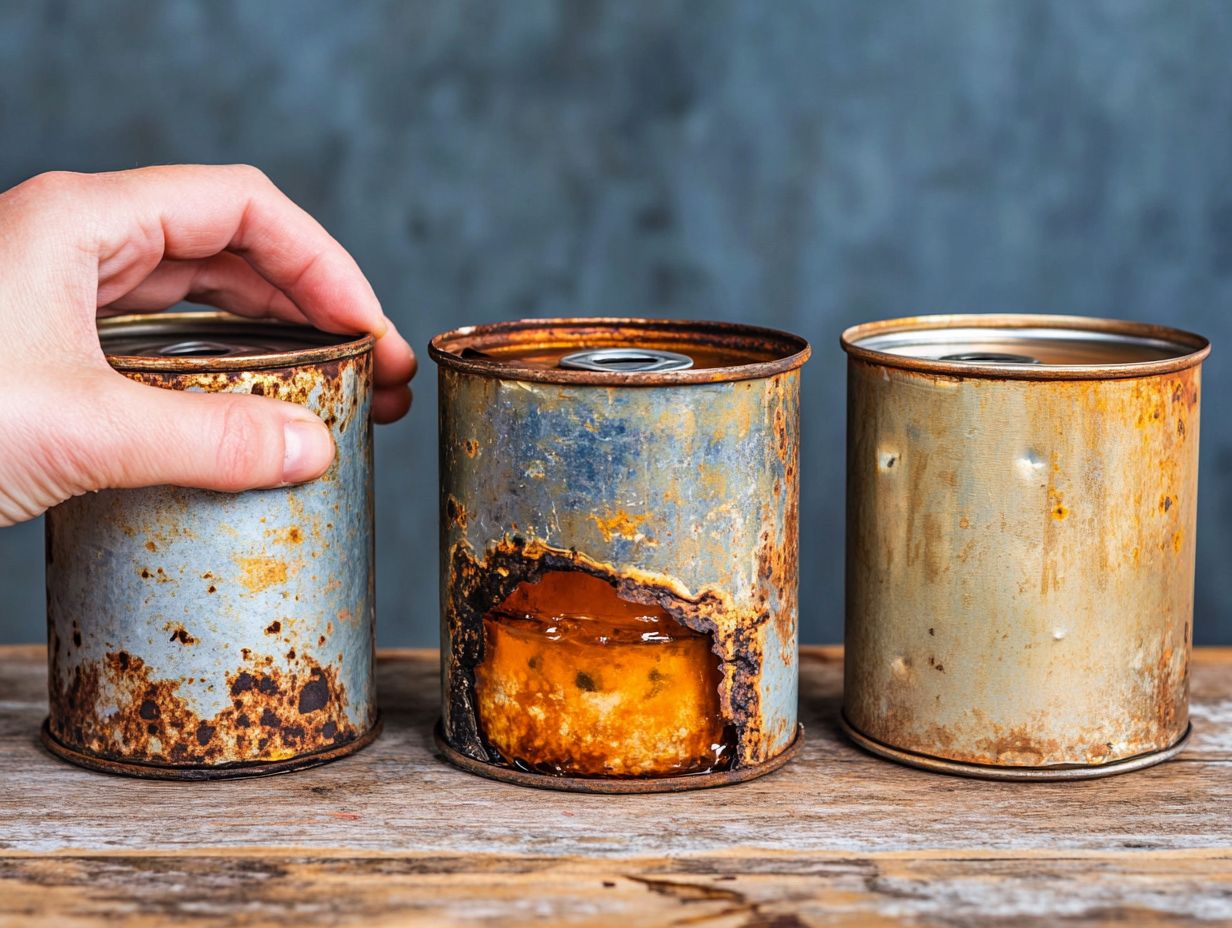
To keep your canned food fresh, follow these specific tips for safe storage and handling procedures:
- Choose a cool, dark, and dry environment, as these factors significantly impact the shelf life of your canned goods.
- Regularly check your inventory for signs of rust or corrosion, which can jeopardize the safety and flavor of the contents.
- Wipe away any dust or spills on the cans before storing them to avoid contamination.
By incorporating these habits, you can ensure that your pantry is stocked with safe and delicious options for longer periods.
Frequently Asked Questions
How to Tell if Canned Food is Bad?
Canned food is a convenient and long-lasting option for storing food. Knowing what to do when your canned food spoils can save you from health risks! Here are some ways to tell if canned food is unsafe:
How can I tell if the canned food has gone bad?
One sign that canned food is bad is if the can is bulging or bloated. This indicates bacterial activity and potential issues like botulism; such food should not be consumed. To learn more about these warning signs, check out the signs of improperly canned food.
Are there any other visual cues to look for?

Another visual cue is if the can is dented, rusted, or damaged. These can compromise the seal, allowing bacteria to enter the can and spoil the food, leading to food poisoning or other gastrointestinal issues.
What about the expiration date?
Always check the expiration date on canned food before consuming it. If the date has passed, it’s best to discard the food to avoid any risk of foodborne illness.
Can I still eat the food if the can is in good condition?
Even if the can looks fine, use your senses to determine if the food has gone bad. If the food has an unusual odor, appearance, or taste, it’s safest to throw it away.
How long can canned food last?
Canned food can last several years, but it’s best to consume it within 2-5 years for optimal quality and safety. If the can is damaged or shows signs of spoilage, discard it immediately.
What should I do if I accidentally eat bad canned food?
If you suspect you’ve eaten bad canned food, don t wait get medical help immediately!
Sickness from spoiled food can hit hard. It’s important to see a doctor who can help you decide the best course of action.
